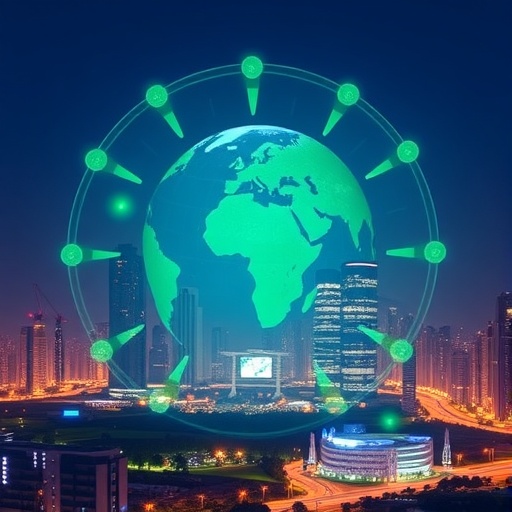The International Telecommunication Union (ITU) is poised to play a pivotal role at the 30th Conference of the Parties (COP30), scheduled to take place in Belém, Brazil, in November 2025. This event marks a critical convergence of global leaders, innovators, and policymakers committed to addressing climate change. Central to ITU’s engagement is the Green Digital Action initiative, a transformative platform dedicated to harnessing digital technology for sustainable development and environmental stewardship. At COP30, ITU will spearhead collaborative efforts aimed at embedding sustainability into the fabric of rapidly evolving digital infrastructures.
As digital technologies continue to permeate every aspect of human life, their environmental footprint has grown correspondingly significant. The burgeoning expansion of technologies such as artificial intelligence (AI), cloud computing, and expansive digital networks demands escalating energy resources, contributing to a notable surge in carbon emissions. Recognizing this, ITU emphasizes the dual importance of mitigating the tech sector’s ecological impact while simultaneously unlocking its potential to champion comprehensive climate solutions. COP30 provides an unprecedented forum for this crucial dialogue, facilitating cooperative strategies that can guide the tech industry toward greener operational paradigms.
The Green Digital Action initiative represents a coalition of over 50 partners, unified in their commitment to propel the ICT sector toward net-zero emissions. Building on momentum garnered at prior climate summits like COP28 and COP29, this initiative seeks to move beyond aspirational commitments to demonstrable progress. At COP30, the focus shifts to practical implementation—showcasing measurable data, cutting-edge tools, and scalable innovations that illustrate the feasibility and urgency of sustainable digital transformation worldwide. The initiative’s strategic approach integrates cross-sectoral innovation to stimulate environmental benefits while promoting economic and social inclusivity.
Central to ITU’s program at COP30 is a series of high-profile events that elucidate the intersection of technology and sustainability. On 10 November, the High-Level Roundtable titled “Leadership and Action Towards a Green Digital Future” underscores the imperative for visionary leadership and coordinated policy frameworks. This forum convenes stakeholders across governments, industry, and civil society to align strategies that foster resilient, low-carbon digital ecosystems. Emphasizing governance and accountability, the dialogue seeks to harmonize international efforts toward shared environmental objectives.
The subsequent day, 11 November, highlights the complex balance between AI innovation and ecological responsibility. The session “Measuring What Matters – Balancing AI Innovation, Impact, and Sustainability” addresses the escalating computational demands of AI systems, which increasingly rely on energy-intensive data centers and processing power. Experts discuss methodologies for quantifying environmental impacts and optimizing AI architectures to minimize their carbon footprint without stymying technological advancement. Later, “Advancing Green Digital Action Towards a Net-Zero ICT Sector” brings attention to actionable pathways for decarbonizing the telecommunications and ICT industries, including renewable energy integration, efficient infrastructure design, and lifecycle management practices.
On 12 November, the dialogue shifts to practical applications and capacity building through “Digital Pathways to a Greener Future: Empowering Climate Solutions Through Technology.” This session explores how digital tools can enhance climate resilience, monitoring, and adaptation strategies at local and global scales. From satellite data analytics to IoT-enabled environmental sensing, technological advances offer precise insights and real-time responsiveness imperative for effective climate action. Additionally, the “AI Innovation Factory” event delves into cutting-edge AI applications that optimize energy consumption, model climate scenarios, and facilitate sustainable urban planning.
Underlying ITU’s approach is a recognition that the digital sector’s sustainability challenges are multidimensional, encompassing technical, social, and political dimensions. Technological innovation must be coupled with international cooperation to create standards, regulations, and incentives underpinning green digital ecosystems. This holistic perspective ensures that digital transformation not only reduces emissions but also supports equitable access to technology and environmental justice. The engagement at COP30 epitomizes this integrative vision, with ITU acting as a catalyst for a global green digital transition.
The urgency of incorporating sustainability into digital development cannot be overstated. As AI and cloud computing scale exponentially, so too does their energy consumption, often reliant on carbon-intensive power grids. Addressing these challenges requires technological reforms such as advanced energy-efficient algorithms, enhanced hardware design, and migration to renewable energy sources. Equally important is the development of robust metrics to assess digital infrastructure’s environmental impact comprehensively. COP30’s Green Digital Action initiative emphasizes transparency and accountability through open data and collaborative research.
Moreover, the digital sector’s potential to mitigate climate change extends far beyond its own emissions. Digital technologies are integral to optimizing energy systems, enabling smart grids, improving logistics to reduce transportation emissions, and facilitating precision agriculture to conserve natural resources. Thus, the commitment to a greener digital sector aligns with broader climate goals, leveraging ICT as both a challenge and a solution. At COP30, ITU and its partners will highlight these interdependencies, promoting digital innovation as a critical enabler of sustainable development.
The collaborative nature of Green Digital Action exemplifies how multilateral partnerships can drive systemic change. By bringing together governments, industry leaders, civil society organizations, and technical experts, the initiative fosters knowledge exchange, harmonization of standards, and joint ventures. This ecosystem approach not only accelerates the deployment of green technologies but also ensures inclusive participation, addressing the digital divide that risks marginalizing vulnerable populations in climate action narratives.
In conclusion, ITU’s participation at COP30 epitomizes a forward-thinking strategy that integrates cutting-edge technology with environmental responsibility. The Green Digital Action initiative serves as a beacon for the digital sector’s potential to contribute meaningfully to global climate objectives. Through concerted efforts, transparent metrics, and innovative policymaking, COP30 promises to catalyze a transformative agenda that secures a sustainable, equitable, and resilient digital future.
Subject of Research: Green Digital Transformation and Sustainability in ICT Sector
Article Title: ITU’s Green Digital Action Initiative at COP30: Catalyzing a Sustainable Digital Future
News Publication Date: 5 November 2025
Web References:
– https://www.itu.int/initiatives/green-digital-action/events/cop30/
– https://trello.com/b/Cu6injyW/media-kit-green-digital-action-cop30
– https://www.itu.int/initiatives/green-digital-action/about-us/intro/
Image Credits: © ITU
Keywords: Sustainability, Technology, Artificial intelligence, Climate change mitigation, Climate change adaptation, Climate change, Greenhouse effect, Telecommunications, International relations, International cooperation




